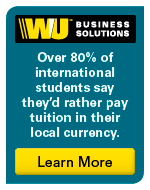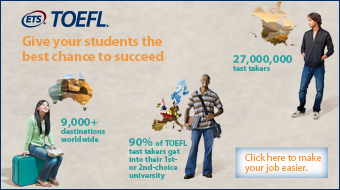
| IIE Home | Membership | Publications | Open Doors | Contact Us | Subscribe |
|
||||||||||||||||
|
||||||||||||||||
|
News
Deadline Extended: October 30, 2014 | Complete Survey Today
Once again, our group of higher education associations is jointly surveying its members/member institutions to gather data comparing this fall’s international student enrollments with last fall’s. The partner organizations are: American Association of Collegiate Registrars and Admissions Officers (AACRAO), American Association of Community Colleges (AACC), American Association of State Colleges and Universities (AASCU), American Council on Education (ACE), Association of Public and Land-grant Universities (APLU), Council of Graduate Schools (CGS), Institute of International Education (IIE), and NAFSA: Association of International Educators.
The purpose of this survey is to obtain quick and early feedback on enrollment trends so far this academic year (starting in Fall 2014). By sharing this information (in aggregate form) with the international education community and the media, we hope to develop a wider understanding among the press, the general public, and policy makers at state and national levels, about how higher education institutions continue to be affected by the various factors which impact international enrollments.
If you do not yet have final fall registration figures, we ask that you provide your best early estimates. All institutional-level responses will be anonymous and only aggregate numbers will be shared. We ask for your contact information only to insure that no more than one reply is received per institution, and to facilitate follow up if there are any questions.
If you are not the best contact for this survey, please forward it to another colleague on your campus who may be able to complete it.
A summary of the results will be posted on the websites of all the cooperating organizations on November 17, 2014, and also distributed to the media in a joint press release. We will send our members copies of the press release as well, in case your school wishes to tailor it for local media use, inserting your own enrollment figures and relevant quotes from campus officials.
Thank you very much for participating in this short survey, which should take no more than 15 minutes to complete, once you have gathered the relevant data. Comments or questions about the survey may be directed to: iieresearch@iie.org.
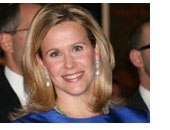 Alexandra Lowe Lees, Senior Development Officer, Fundraising, Events, and IIE Initiatives, shares about hosting His Majesty the King of Spain at IIE New York headquarters last month. "We were honored and thrilled King Felipe selected IIE to be his first U.S. public appearance to speak with a select audience, including many U.S. and Spanish students and alumni from the U.S. Department of State’s Fulbright Program," writes Lees. Alexandra Lowe Lees, Senior Development Officer, Fundraising, Events, and IIE Initiatives, shares about hosting His Majesty the King of Spain at IIE New York headquarters last month. "We were honored and thrilled King Felipe selected IIE to be his first U.S. public appearance to speak with a select audience, including many U.S. and Spanish students and alumni from the U.S. Department of State’s Fulbright Program," writes Lees.An article in the Washington Post discusses concerns that Ebola might curtail the flow of international students in the coming year. Interviewed for the article, IIE President and Chief Executive Officer Allan Goodman remarked, "American higher education has shown through repeated crises, whether terrorism, disease or natural disasters, that we want to keep our doors open. It reflects our enduring values—and the benefits that foreign students bring to our campuses ... including West Africans."
Harvard University Professor and Senior Fellow at Stanford’s Hoover Institution Niall Ferguson has joined Schwarzman Scholars as Distinguished Visiting Professor. According to a recent article in Business Wire announcing his appointment, "Ferguson will reside in Schwarzman College, the residential building where the Scholars live and study, fully engaging with the students as a mentor and instructor. He will teach courses for Schwarzman Scholars, as well as for the Tsinghua School of Economics and Management, and will participate in the Schwarzman Scholars endowed lecture series in Beijing."
Karen MacGregor shares in University World News highlights of a World Education Services (WES) report "Bridging the Digital Divide: Segmenting and recruiting international millennial students." "A survey of nearly 5,000 America-bound international students has recommended that to boost recruitment, universities should adapt to student technology use, embrace the marketing power of the university network and tailor content to communicate their value propositions to students," writes MacGregor.
Research showing a 55 percent increase in the number of Italian high school students embarking on long-term study abroad has encouraged the Italian government to extend its European high school study abroad scholarship program (PON) throughout the country, according to a recent article in The PIE News, "Around a quarter of the 500 staff interviewed said that limited access to funding is the primary barrier to study abroad."
Conferences
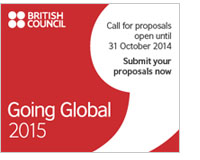 June 1-2, 2015 | London June 1-2, 2015 | LondonProposal Deadline: October 31, 2014 | Proposal and Conference Details
Going Global is an annual conference hosted by the British Council, which provides a forum for world leaders in education to network, debate international tertiary education issues and challenges, and to discuss creative, collaborative solutions. The conference welcomes leaders and practitioners within the tertiary education sector as well as education ministers, journalists, policy makers, and industry representatives. Going Global 2015 will take place at the Queen Elizabeth II Conference Centre, London. The theme for this year is Connecting Cultures, Forging Futures. To contribute your unique perspective on these themes, submit a proposal before the deadline of Friday, October, 31, 2014.
If you have any questions please contact Going.Global@britishcouncil.org.
December 4, 2014 | Brussels
Early Registration Deadline: November 13, 2014 | Registration and Seminar Details
A rare phenomenon at the turn of the century, English-medium instruction (EMI) has become a systemic feature in some European countries, particularly at the Master level. Even though the growth curve now shows signs of flattening, English-taught programs have become immensely numerous and popular in the last 15 years. This ACA European Policy Seminar will present, amongst other things, the key findings of ACA`s latest (2014) Europe-wide surveys of this form of tuition.
But the seminar will present far more than the recent ACA study. In an opening presentation, Adrian Veale of the European Commission will tackle the difficult question which language—or languages—Europe`s new global outreach strategy ("Europe in the world") should use to attract the world`s young talents to Europe`s universities and colleges.
Deadlines
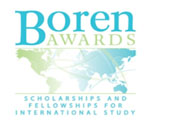 The applications for the 2015-2016 Boren Scholarships and Fellowships are now available at www.borenawards.org. Boren Awards, an initiative of the National Security Education Program and administered by the Institute of International Education, provide unique funding opportunities for U.S. undergraduate and graduate students to study in Africa, Asia, Central & Eastern Europe, Eurasia, Latin America, and the Middle East, where they can add important international and language components to their educations. The applications for the 2015-2016 Boren Scholarships and Fellowships are now available at www.borenawards.org. Boren Awards, an initiative of the National Security Education Program and administered by the Institute of International Education, provide unique funding opportunities for U.S. undergraduate and graduate students to study in Africa, Asia, Central & Eastern Europe, Eurasia, Latin America, and the Middle East, where they can add important international and language components to their educations.Boren Scholarships for Undergraduate Students Deadline: February 4, 2015 (each campus sets an earlier campus deadline)
Boren Fellowships for Graduate Students Deadline: January 27, 2015 For the fifth year in a row, through the African Flagship Languages Initiative (AFLI) funding is available for Boren Scholars and Fellows to study one of the following languages domestically, prior to commencing their overseas Boren funded programs:
In addition, AFLI overseas programs are available for intensive language and cultural study during fall 2015 in the following countries.
To learn more about the Boren Awards and AFLI, to register for one of our upcoming webinars, and to access the on-line application, please visit www.borenawards.org. We have webinars that focus on AFLI scheduled for November 14 and January 7. You can also contact the Boren Awards staff at boren@iie.org or 1-800-618-NSEP with questions.
Application Deadline November 1, 2014 | Application and Program Details
The Robert Bosch Foundation and Cultural Vistas invite U.S. professionals to apply for the 2015-2016 Robert Bosch Foundation Fellowship Program. Bosch Fellows work as consultants in their field of expertise at leading public or private institutions in Germany. In addition, Bosch Fellows participate in professional seminars, where they travel to meet and exchange ideas with key figures across Germany and Europe. Fellows are from the fields of business administration, cultural management (ex. museum, theater, orchestra), journalism, law, non-profit, public policy, and urban planning.
PROGRAM HIGHLIGHTS
QUALIFICATIONS
Application Deadline: January 20, 2015, 11:59 PM | Application and Program Details
The Payne Program is designed to attract outstanding young people to careers in international development as USAID Foreign Service Officers. The Payne Fellowship Program provides benefits valued at up to $90,000 over two years toward a two-year master's degree, arranges internships in Washington D.C. and at USAID missions overseas, and provides professional development and support activities. Fellows who successfully complete the program become USAID Foreign Service Officers. Fellows may use the fellowship to attend a two-year master's program in a U.S. institution to study an area of relevance to the USAID Foreign Service, including international development, international relations, public policy, business administration, foreign languages, economics, agriculture, environmental sciences, health, or urban planning at a graduate or professional school approved by the Payne Program. At the end of the two-year fellowship, Fellows enter the USAID Foreign Service.
Applicants must be college seniors or graduates looking to start graduate school in the fall of the year they apply, have GPAs of at least 3.2 and be U.S. citizens. The program welcomes applications from those with any undergraduate major and encourages applications from members of minority groups historically underrepresented in the USAID Foreign Service and those with financial need. Information and application materials for the program are available at www.paynefellows.org. The Program is funded by USAID and managed by Howard University.
Fulbright
 The Fulbright International Education Administrators (IEA) Program is designed for experienced international education administrators and senior higher education administrators in the United States interested in learning about the societal, cultural, and higher education systems of France, Germany, India, Japan, or Korea. The Fulbright International Education Administrators (IEA) Program is designed for experienced international education administrators and senior higher education administrators in the United States interested in learning about the societal, cultural, and higher education systems of France, Germany, India, Japan, or Korea. Each country program offers an in-depth, two-week seminar comprised of group visits to colleges and universities, secondary level school systems, government agencies, and related educational organizations. IEA grantees network with host country counterparts to gain a basic understanding of their higher education system including program designs, organizational structures, quality assurance procedures, and credit and degree expectations, as well as social and cultural customs and norms.
Only applications demonstrating a strong desire to enhance study abroad faculty and student exchanges, international collaborative research or international curricular design at a U.S. 2- or 4-year college, university, or nonprofit international education exchange organization will be considered.
Upcoming Deadline: Applications for the Japan and Korea IEA Programs are due November 3, 2014.
To learn more about the Fulbright IEA Program, please visit www.cies.org/iea.
The Fulbright Program, sponsored by the U.S. Department of State’s Bureau of Educational and Cultural Affairs, is the U.S. government’s flagship international exchange program and is supported by the people of the United States and partner countries around the world. For more information, visit eca.state.gov/fulbright.
Partnerships
November 22, 2014, 9:00 AM–1:30 PM | Delhi NCR, India
The Confederation of Indian Industry (CII) and the Institute of International Education invite you to participate in a workshop on "Building Sustainable Global Academic Partnerships."
The CII-IIE Workshop is a capacity building workshop for universities in the U.S. and India that will focus on sustaining existing partnerships, by identifying strategies to learn how to effectively manage those partnerships. The emphasis for the workshop is to engage individuals through a series of panel and roundtable discussions led by higher education experts from the U.S. and India.
Workshop Highlights:
For questions about the event, please reach out to Dr. Shruti Jain at SJain@iie.org or 011-26516873.
Study Abroad
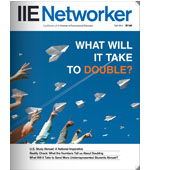 Co-curricular programs represent a fast-growing segment of international exchange among U.S. students. In their article in the latest edition of IIENetworker magazine, James Paul Holloway and Amy Conger write about the benefits of this type of exchange and share successful program models. "In addition to increased capacity, co-curricular experiences provide unique engaged learning opportunities that cannot be realized in a traditional classroom," write Holloway and Conger. "Increasing co-curricular programs and projects abroad is not complex, but it requires a few key ingredients." Co-curricular programs represent a fast-growing segment of international exchange among U.S. students. In their article in the latest edition of IIENetworker magazine, James Paul Holloway and Amy Conger write about the benefits of this type of exchange and share successful program models. "In addition to increased capacity, co-curricular experiences provide unique engaged learning opportunities that cannot be realized in a traditional classroom," write Holloway and Conger. "Increasing co-curricular programs and projects abroad is not complex, but it requires a few key ingredients."An article in Penn State News shares about a new study-abroad course that focuses on disability. The course will be offered to Penn State students and will take place in Ireland. According to Assistant Professor Wendy Coduty interviewed for the article, "Students in this course will learn about different aspects of culture and disability through meeting with various service agencies in Ireland that provide resources, advocacy and assistance to people with many different types of disabilities."
Scholar Rescue Fund
Ita Sheehy, Senior Education Advisor for the UN High Commissioner for Refugees (UNHCR), advocates in University World News for more higher education opportunities for refugees. At a time when the number of refugees, asylum-seekers, and internally displaced people worldwide has, exceeded 50 million, there are high risks of entire generations losing access to education—especially higher education, which is perceived as a luxury. "Yet, higher education for refugees is important both for individuals and for society, not least in terms of rebuilding lives and fostering leadership in both protracted settings and peaceful post-conflict reconstruction," writes Sheehy.
|
| www.iie.org/iienetwork • Member website of the Institute of International Education © 2025 Institute of International Education. All rights reserved. |
